
Hamilton is an inland city in the North Island of New Zealand. Located on the banks of the Waikato River, it is the seat and most populous city of the Waikato region. With a territorial population of 185,300, it is the country's fourth most-populous city. Encompassing a land area of about 110 km2 (42 sq mi), Hamilton is part of the wider Hamilton Urban Area, which also encompasses the nearby towns of Ngāruawāhia, Te Awamutu and Cambridge. In 2020, Hamilton was awarded the title of most beautiful large city in New Zealand. Hamilton is now considered the fastest growing city in the country.
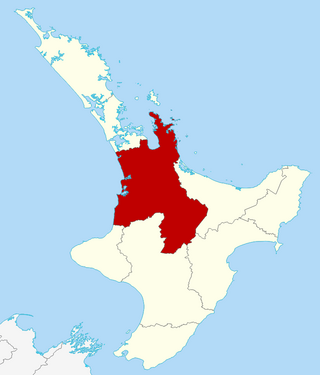
Waikato is a region of the upper North Island of New Zealand. It covers the Waikato District, Waipa District, Matamata-Piako District, South Waikato District and Hamilton City, as well as Hauraki, Coromandel Peninsula, the northern King Country, much of the Taupō District, and parts of the Rotorua Lakes District. It is governed by the Waikato Regional Council.
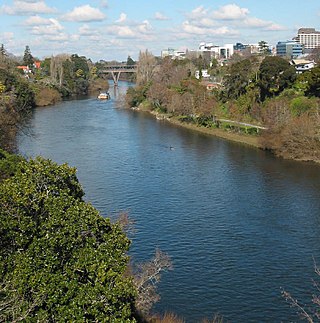
The Waikato River is the longest river in New Zealand, running for 425 kilometres (264 mi) through the North Island. It rises on the eastern slopes of Mount Ruapehu, joining the Tongariro River system and flowing through Lake Taupō, New Zealand's largest lake. It then drains Taupō at the lake's northeastern edge, creates the Huka Falls, and flows northwest through the Waikato Plains. It empties into the Tasman Sea south of Auckland, at Port Waikato. It gives its name to the Waikato region that surrounds the Waikato Plains. The present course of the river was largely formed about 17,000 years ago. Contributing factors were climate warming, forest being reestablished in the river headwaters and the deepening, rather than widening, of the existing river channel. The channel was gradually eroded as far up river as Piarere, leaving the old Hinuera channel through the Hinuera Gap high and dry. The remains of the old course are seen clearly at Hinuera, where the cliffs mark the ancient river edges. The Waikato's main tributary is the Waipā River, which converges with it at Ngāruawāhia.
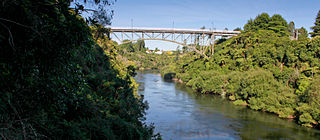
Cambridge is a town in the Waipa District of the Waikato region of the North Island of New Zealand. Situated 24 kilometres (15 mi) southeast of Hamilton, on the banks of the Waikato River, Cambridge is known as "The Town of Trees & Champions". The town has a population of 21,800, making it the largest town in the Waipa District, and the third largest urban area in the Waikato.
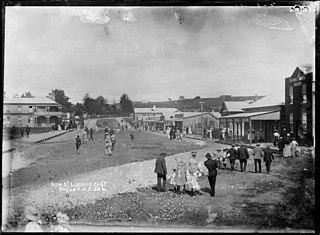
Raglan is a small beachside town located 48 km west of Hamilton, New Zealand on State Highway 23. It is known for its surfing, and volcanic black sand beaches.
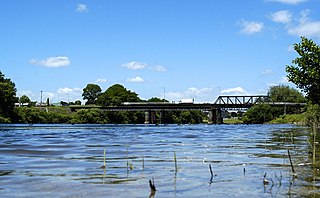
Ngāruawāhia is a town in the Waikato region of the North Island of New Zealand. It is located 20 kilometres (12 mi) north-west of Hamilton at the confluence of the Waikato and Waipā Rivers, adjacent to the Hakarimata Range. Ngāruawāhia is in the Hamilton Urban Area, the fourth largest urban area in New Zealand. The location was once considered as a potential capital of New Zealand.

Te Awamutu is a town in the Waikato region in the North Island of New Zealand. It is the council seat of the Waipa District and serves as a service town for the farming communities which surround it. Te Awamutu is located some 30 kilometres (19 mi) south of Hamilton on State Highway 3, one of the two main routes south from Auckland and Hamilton.

Wellington Botanic Gardenki Paekākā is a botanical garden close to central Wellington in New Zealand. It covers 25 ha of land in a valley between Thorndon and Kelburn, with Glenmore Street as a boundary along the valley floor. One of the access points is from the top of the Wellington Cable Car. The garden is managed by Wellington City Council, and features protected native forest, conifers, plant collections and seasonal displays and an extensive rose garden. It is classified as a Garden of National Significance by the New Zealand Gardens Trust. In 2004 it was listed as a historic area by Heritage New Zealand. Large sculptures and carvings are located throughout the garden.

Wolfbrook Arena is an indoor arena in Christchurch, New Zealand. It is located in the suburb of Addington. It has gone through a series of name changes, the most recent of which prior to its current name having been Christchurch Arena.

FMG Stadium Waikato is a major sporting and cultural events venue in Hamilton, New Zealand, with a total capacity of 25,800. Four areas contribute to this capacity: The Brian Perry Stand holding 12,000, the WEL Networks Stand holding 8,000, the Goal Line Terrace holding 800 and the Greenzone can hold up to 5,000 people. The capacity can be extended, however, by temporarily adding 5,000 seats to the Goal Line Terrace area. The stadium, owned by the Hamilton City Council, regularly hosts two rugby union teams:
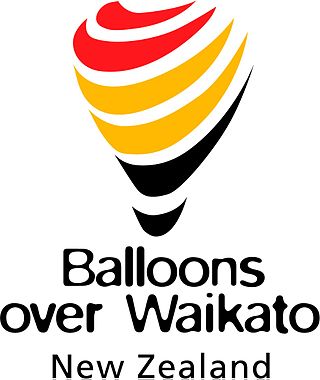
Balloons over Waikato is an annual hot air balloon festival held in Hamilton, New Zealand since 1999 by the non-profit organisation Balloons over Waikato Trust. The event spans five days during autumn and attracts both local and overseas balloonists. The Festival is held primarily at Innes Common, at Hamilton Lake, which gets an estimated 130,000 visitors during the festival. The highlight of the festival, the "Night glow" is held at the University of Waikato where an estimated 80,000+ people attend to watch the lighting of balloons putting on a spectacular glow to music.

Te Rapa is a mixed light industrial, large-scale retail and semi-rural suburb to the northwest of central Hamilton, New Zealand that is built on a flat area that was previously the bed of an ancient river, the forerunner to the present Waikato River.

Hamilton East is a suburb in central Hamilton in New Zealand. The suburb's primary commercial and retail precinct is located along Grey Street. Hamilton East is characterised by villas and bungalows built early in the 20th century.

Tūheitia Pōtatau Te Wherowhero VII, crowned as Kīngi Tūheitia, is the Māori King. He is the eldest son of the previous Māori monarch, Te Arikinui Dame Te Atairangikaahu, and was announced as her successor and crowned on 21 August 2006, the day her tangihanga took place.

The TSB Arena is an indoor arena in Wellington.

Waikato Museum is a regional museum located in Hamilton, New Zealand. The museum manages ArtsPost, a shop and gallery space for New Zealand art and design. Both are managed by the Hamilton City Council. Outside the museum is The Tongue of The Dog, a sculpture by Michael Parekōwhai that has helped to increase visitor numbers. The sculpture was commissioned by MESH Sculpture Trust, Hamilton.
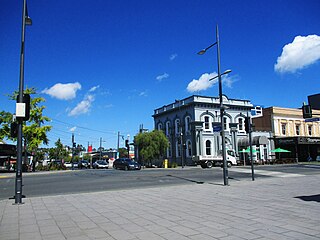
Hamilton Central is the central business district of Hamilton, New Zealand. It is located on the western banks of the Waikato River.
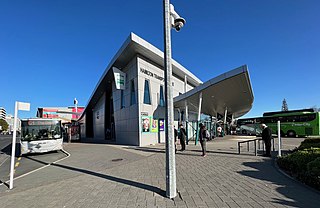
Public transport in Hamilton and the Waikato Region consists mainly of bus services, as well as some limited train and ferry services. Services are mainly infrequent, and investment hasn't been sufficient to compete with cars, so that subsidies, first introduced in 1971, have increased.
Horotiu is a small township on the west bank of the Waikato River in the Waikato District of New Zealand. It is on the Waikato Plains 13 km (8.1 mi) north of Hamilton and 5 km (3.1 mi) south of Ngāruawāhia. From early in the 20th century it developed around a freezing works and other industries.































